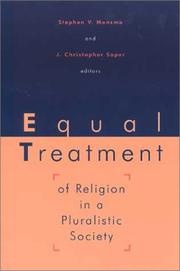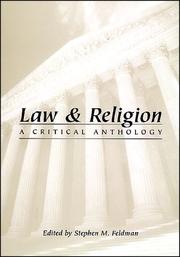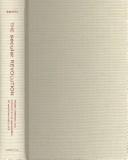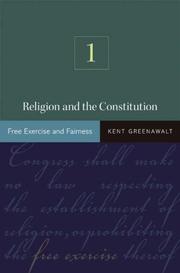| Listing 1 - 10 of 30 | << page >> |
Sort by
|
Book
ISBN: 0896331784 Year: 1993 Publisher: Washington, DC Ethics and Public Policy Center
Abstract | Keywords | Export | Availability | Bookmark
 Loading...
Loading...Choose an application
- Reference Manager
- EndNote
- RefWorks (Direct export to RefWorks)

ISBN: 0802842968 9780802842961 Year: 1998 Publisher: Grand Rapids: Eerdmans,
Abstract | Keywords | Export | Availability | Bookmark
 Loading...
Loading...Choose an application
- Reference Manager
- EndNote
- RefWorks (Direct export to RefWorks)

ISBN: 0814726798 081472678X 9780814726792 9780814726785 Year: 2000 Publisher: New York: New York University press,
Abstract | Keywords | Export | Availability | Bookmark
 Loading...
Loading...Choose an application
- Reference Manager
- EndNote
- RefWorks (Direct export to RefWorks)
Church and state --- Religion and law --- Religion and law. --- Church and state - United States. --- Religion and law - United States.
Book
ISBN: 1316354830 1316361233 1316363236 131636223X 1316364232 1139061151 131635783X 1107016509 1108448046 9781108448048 9781107016507 1316348830 9781316357835 9781139061155 Year: 2015 Publisher: Cambridge Cambridge University Press
Abstract | Keywords | Export | Availability | Bookmark
 Loading...
Loading...Choose an application
- Reference Manager
- EndNote
- RefWorks (Direct export to RefWorks)
In recent decades, religion's traditional distinctiveness under the First Amendment has been challenged by courts and scholars. As America grows more secular and as religious and nonreligious convictions are increasingly seen as interchangeable, many have questioned whether special treatment is still fair. In its recent decisions, the Supreme Court has made clear that religion will continue to be treated differently, but we lack a persuasive account of religion's uniqueness that can justify this difference. This book aims to develop such an account. Drawing on founding era thought illumined by theology, philosophy of religion, and comparative religion, it describes what is at stake in our tradition of religious freedom in a way that can be appreciated by the religious and nonreligious alike. From this account, it develops a new framework for religion clause decision making and explains the implications of this framework for current controversies regarding protections for religious conscience.
Book
ISBN: 3666101119 1282165550 9786613808622 3647101117 3525101112 9783525101117 9783666101113 9781282165557 9783647101118 Year: 2012 Publisher: Göttingen : Vandenhoeck & Ruprecht,
Abstract | Keywords | Export | Availability | Bookmark
 Loading...
Loading...Choose an application
- Reference Manager
- EndNote
- RefWorks (Direct export to RefWorks)
Hauptbeschreibung Es gehört zu den Errungenschaften der Neuzeit, einer Vermischung von Kirche und Staat zu wehren. Weder soll die Kirche theokratisch das politische Gemeinwesen bestimmen noch der Staat totalitär über die Kirche herrschen. Kirche und Staat sollen getrennt sein. Deutschland, Frankreich und die USA versuchen auf je andere Weise, diese notwendige Trennung von Kirche und Staat zu realisieren. Was war der Grund für die unterschiedlichen Modelle? Worin liegen die Stärken, worin die Schwächen des jeweiligen Modells? In jüngster Zeit stellen sich diese Fragen neu, nicht nur

ISBN: 0520235614 9780520235618 Year: 2003 Publisher: Berkeley (Calif.): University of California press,
Abstract | Keywords | Export | Availability | Bookmark
 Loading...
Loading...Choose an application
- Reference Manager
- EndNote
- RefWorks (Direct export to RefWorks)
Book
ISBN: 9780195326246 0195326245 Year: 2010 Publisher: New York: Oxford university press,
Abstract | Keywords | Export | Availability | Bookmark
 Loading...
Loading...Choose an application
- Reference Manager
- EndNote
- RefWorks (Direct export to RefWorks)
Sociology of religion --- United States --- Church and state --- Freedom of religion --- Religion and law --- Church history --- Church and state - United States --- Freedom of religion - United States --- Religion and law - United States --- United States - Church history --- United States of America
Book
ISBN: 0691075743 1400871212 9780691075747 Year: 1976 Publisher: Princeton (N.J.): Princeton university press,
Abstract | Keywords | Export | Availability | Bookmark
 Loading...
Loading...Choose an application
- Reference Manager
- EndNote
- RefWorks (Direct export to RefWorks)
This is the story of some of the most anguished constitutional controversies of our time, those involving the issue of separation of church and state. Few questions stimulated debate as intense as that over prayer in public schools and public aid to parochial schools. In contrast to previous studies, which have focused on the substance of the issues, Frank J. Sorauf's book concentrates on the judicial process in its social and political context. The author discusses all sixty-seven cases in this area of litigation decided by high American appellate courts from 1951 to 1971. He has interviewed the plaintiffs, attorneys, and members of the groups bringing suit, and describes their strategies and goals, their successes and failures. The community context in which the cases developed, as well as the judges and the courts deciding them, is described and analyzed.Originally published in 1976.The Princeton Legacy Library uses the latest print-on-demand technology to again make available previously out-of-print books from the distinguished backlist of Princeton University Press. These editions preserve the original texts of these important books while presenting them in durable paperback and hardcover editions. The goal of the Princeton Legacy Library is to vastly increase access to the rich scholarly heritage found in the thousands of books published by Princeton University Press since its founding in 1905.
Church and state --- Ecclesiastical law --- 322 <73> --- 322 <73> Godsdienstige tolerantie. Godsdienstpolitiek--Verenigde Staten van Amerika. VSA. USA --- Godsdienstige tolerantie. Godsdienstpolitiek--Verenigde Staten van Amerika. VSA. USA --- Ecclesiastical law - United States --- Church and state - United States
Book
ISBN: 9780674724754 0674724755 0674730135 0674730968 9780674730137 Year: 2014 Publisher: Cambridge, Massachusetts ; London, England : Harvard University Press,
Abstract | Keywords | Export | Availability | Bookmark
 Loading...
Loading...Choose an application
- Reference Manager
- EndNote
- RefWorks (Direct export to RefWorks)
Familiar accounts of religious freedom in the United States often tell a story of visionary founders who broke from centuries-old patterns of Christendom to establish a political arrangement committed to secular and religiously neutral government. These novel commitments were supposedly embodied in the religion clauses of the First Amendment. But this story is largely a fairytale, Steven Smith says in this incisive examination of a much-mythologized subject. The American achievement was not a rejection of Christian commitments but a retrieval of classic Christian ideals of freedom of the church and of conscience. Smith maintains that the First Amendment was intended merely to preserve the political status quo in matters of religion. America's distinctive contribution was, rather, a commitment to open contestation between secularist and providentialist understandings of the nation which evolved over the nineteenth century. In the twentieth century, far from vindicating constitutional principles, as conventional wisdom suggests, the Supreme Court imposed secular neutrality, which effectively repudiated this commitment to open contestation. Instead of upholding what was distinctively American and constitutional, these decisions subverted it. The negative consequences are visible today in the incoherence of religion clause jurisprudence and the intense culture wars in American politics.
Freedom of religion --- Church and state --- Liberté religieuse --- Eglise et Etat --- Church and state -- United States. --- Freedom of religion -- United States. --- Constitutional Law - U.S. --- United States --- American religious freedom --- Christian-Paganism --- the First Amendment --- religion

ISBN: 9780691141145 0691125821 9780691125824 1400827523 9786612721878 1282721879 0691141134 9781400827527 0691141142 069112583X 1282820915 1400828236 9786612820915 9781282820913 9781400828234 9781282721876 Year: 2006 Publisher: Princeton, N.J. : Princeton University Press,
Abstract | Keywords | Export | Availability | Bookmark
 Loading...
Loading...Choose an application
- Reference Manager
- EndNote
- RefWorks (Direct export to RefWorks)
Balancing respect for religious conviction and the values of liberal democracy is a daunting challenge for judges and lawmakers, particularly when religious groups seek exemption from laws that govern others. Should members of religious sects be able to use peyote in worship? Should pacifists be forced to take part in military service when there is a draft, and should this depend on whether they are religious? How can the law address the refusal of parents to provide medical care to their children--or the refusal of doctors to perform abortions? Religion and the Constitution presents a new framework for addressing these and other controversial questions that involve competing demands of fairness, liberty, and constitutional validity. In the first of two major volumes on the intersection of constitutional and religious issues in the United States, Kent Greenawalt focuses on one of the Constitution's main clauses concerning religion: the Free Exercise Clause. Beginning with a brief account of the clause's origin and a short history of the Supreme Court's leading decisions about freedom of religion, he devotes a chapter to each of the main controversies encountered by judges and lawmakers. Sensitive to each case's context in judging whether special treatment of religious claims is justified, Greenawalt argues that the state's treatment of religion cannot be reduced to a single formula. Calling throughout for religion to be taken more seriously as a force for meaning in people's lives, Religion and the Constitution aims to accommodate the maximum expression of religious conviction that is consistent with a commitment to fairness and the public welfare.
Religious studies --- United States --- Church and state --- Freedom of religion --- Freedom of religion - United States --- Church and state - United States --- Etats-Unis --- freedom of religion --- Church and State --- law and religion --- constitution
| Listing 1 - 10 of 30 | << page >> |
Sort by
|

 Search
Search Feedback
Feedback About UniCat
About UniCat  Help
Help News
News